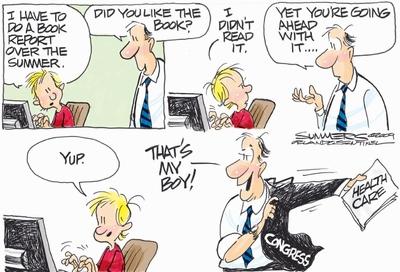by Matthew Dallek

The Social Security Lesson: Progressives should prefer a flawed healthcare reform law over a perfect bill that never passes
Matthew Dallek, a visiting scholar at the Bipartisan Policy Center, teaches history and politics at the University of
California Washington Center.
Progressives are grousing about healthcare reform.
They have declared that a series of provisions must be included in any final overhaul of the nation's healthcare system or else they may torpedo the legislation.
Roughly speaking, they argue that a "public option" that would compete with private insurers is a non-negotiable element of any plan. And they have championed other provisions to pay for reform that will impose a new surtax on individuals making over $280,000 a year and new fees on businesses that refuse to offer healthcare coverage to their workers.
They should take a lesson from history: In 1935, many progressives were unhappy with the legislation that ultimately produced Social Security. But ultimately they found that an imperfect bill could be corrected later, unlike a perfect bill that never passes. In the eyes of a lot of progressives today, this is a make-or-break-moment. Former Senate Majority Leader Tom Daschle, a founder of the Bipartisan Policy Center who recently endorsed a reform plan with fellow former Senate leaders Howard Baker and Bob Dole which would provide health insurance to all Americans, recently said that July would be perhaps the most significant month in the history of healthcare reform in this country. He wasn't wrong.
The fights around healthcare that have erupted in recent weeks highlight the much broader divisions within American politics in 2009. The Democratic National Committee's Organizing for America campaign arm is running a television ad that aims to pressure Democratic and Republican moderates to support more liberal healthcare legislation. Some unions have declared their opposition to one centrist proposal that would lift tax breaks on "gold-plated" healthcare benefits. Some conservatives, meanwhile, have hyperbolically claimed that Obama's reform agenda would impose a socialistic state on the American people. Where one stands on healthcare reform in 2009 indicates where one stands on the broader American political spectrum.
The issues that emerged around Social Security legislation during the 1935 debate were equally divisive--especially on the left. Progressives claimed that several key provisions of Social Security legislation shortchanged the average American worker. The bill, they said, gave too much authority to the states to determine the levels of unemployment compensation that would be paid to workers in certain industries. As Robyn Muncy, an associate professor of history at the University of Maryland who is writing a biography of liberal reformer Josephine Roche and is an expert on 20th century liberalism, points out, the unemployment compensation system offered a "patchwork" approach that a lot of progressives ultimately found unsatisfactory.
Social Security reform also failed to include a provision for healthcare coverage for the American people--another sticking point for progressives. And instead of redistributing income to the less-well-to-do as some progressives had wanted Social Security reform to do, the new legislation actually imposed a regressive tax on employees and employers with the payroll tax.
Domestic workers, agricultural laborers, and teachers were among the groups who were written out of sections of the Act, and this fact, combined with other provisions, essentially served to exclude "the majority of black workers and women workers ... from the old-age pension program," according to Muncy.
But liberals' disappointment ultimately gave way to a new faith in what Social Security did achieve. In the post-World War II era, liberals concluded that Social Security had vividly demonstrated the power of federal action to improve the lives of the American people. Social Security helped reduce poverty levels among elderly Americans. And it established as rights for the first time that the government should provide benefits for the aged and unemployed.
A consensus in American politics about Social Security developed. A Republican president, Dwight Eisenhower, endorsed Social Security and agreed to amendments that extended benefits to more than 10 million additional workers. When Republican presidential nominee Barry Goldwater proposed turning Social Security into a voluntary program in his 1964 campaign, Lyndon Johnson crushed him on Election Day. And by 1983, Republican President Ronald Reagan, who had once sided with Goldwater, enacted a bipartisan plan that ultimately shored up the Social Security system for generations to come. Meantime, on the left, Social Security became a sacrosanct social reform--a thriving model of legislative action that made a meaningful difference for virtually all American families. Perhaps a similar consensus will one day emerge around a healthcare reform bill.
Social Security enshrined ideas ranging from unemployment compensation and aid to dependent children to the concept of social
insurance for the elderly and other Americans as new social rights.
It seems safe to assume that the current liberal opposition to a reform plan without a "public option" will diminish, provided final
legislation covers all Americans. So it's conceivable that healthcare reform will establish the principle of universal healthcare coverage
as a right for all Americans, also for the first time, after decades of struggle.
It's hard to exaggerate how significant such a development would be.
While progressives understandably criticized Social Security in 1935 as flawed, they came to regard it as possibly the single
greatest achievement of liberalism in the middle of the 20th century.
Progressives one day may point to Obama's healthcare reform legislation -- regardless of the contentious provisions under debate today --
and cite it as the most important progressive action of the early 21st century.
NEWS & CURRENT EVENTS ...
WORLD |
AFRICA |
ASIA |
EUROPE |
LATIN AMERICA |
MIDDLE EAST |
UNITED STATES |
ECONOMICS |
EDUCATION |
ENVIRONMENT |
FOREIGN POLICY |
POLITICS
